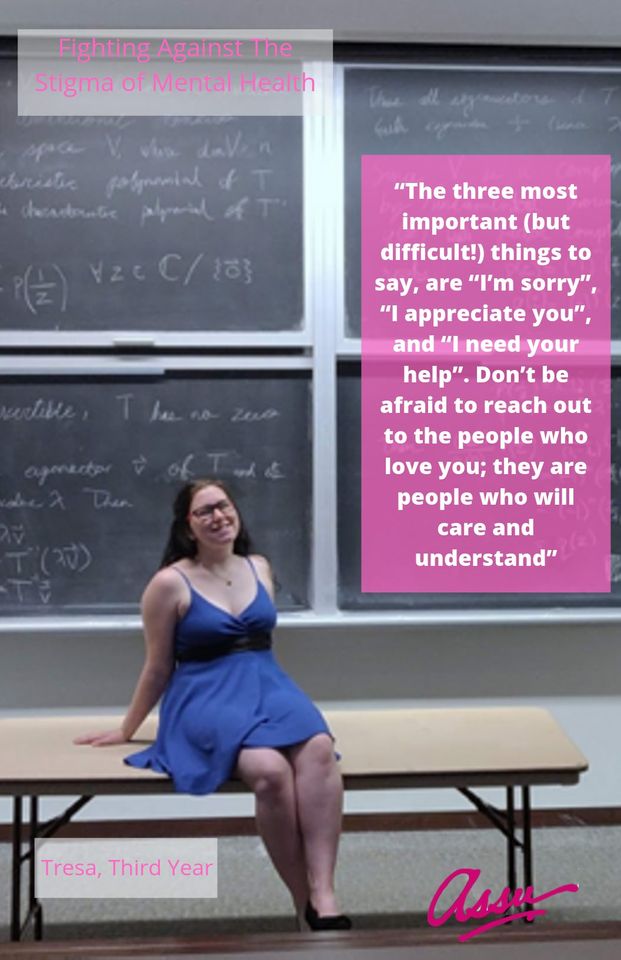Meet Tresa!
Tresa is a 3rd year student doing a double major in Mathematics and Psychology. She’s extremely vivacious and loves being with her friends. Tresa loves playing video games, bad puns, and cooking. She’s passionate about teaching and hopes to pursue a career in education. She grew up in a small Acadian town in Nova Scotia but loves Toronto. She even thinks the TTC is great (even though many people say otherwise).
Moving On From…
Tresa’s family has a long history of dealing with mental health, notably anxiety disorders. She too suffers from anxiety and panic attacks. The stress of starting university while worrying about finances, meeting GPA requirements and dealing with her personal life amplified her anxiety. She was also still coping with her father’s death, which occurred months before transitioning to university. Because of her constant worrying, Tresa feels as if she is constantly fighting with herself. In order to try and overcome that worry filled voice, Tresa has developed coping strategies that work best for her¬, such as determining which worries are unproductive. Her experience dealing with her mental health led Tresa to take a suicide intervention class and a mental health first aid class, because she wants to be able to be there for people like people have been there for her.
Tresa comes from an Acadian, French-speaking town in Nova Scotia. She went to a public high school and when transitioning into university, realized that her high school curriculum did not prepare her at all for writing at a higher academic level. In high school, Tresa was told her good grades meant she was intelligent, but after a turbulent first year, her grades dipped drastically. She realized that she had to change her fixed mindset that tied her worth to her GPA. She still struggles with that insecurity, but with a lot of support and introspection she is finding ways to overcome that mindset.
Being alone at university initially gave Tresa a newfound sense of independence; however, Tresa had poor time management skills and would go to bed far too late. She would spend her time socializing and start her assignments a few days prior to their deadlines. She was barely able to balance a full course load. Tresa decided to try out time management workshops, as well as talking to a learning strategist, and she learned helpful tips from them. Making friends with the people in her courses also helped keep herself accountable.
After a friend pointed out how her anxiety unnecessarily affected her grades, Tresa realized she might need help coping with the stresses of academic life. She reached out to Accessibility Services and was granted accommodations for test taking as well as a reduced course load, that she notes helped to take a huge weight off her shoulders. Tresa acknowledges how tying her grades and the typical path to graduation to her self-worth prevented her from getting this help earlier. She realized that she could do (and feel) better than ‘just getting by’, and she’s glad she finally asked for help.
Tresa is the first in her family to go to university, which comes with pros and cons. Her family is extremely proud of her but doesn’t always understand the challenges it brings. Studying in Toronto has made Tresa more focused on diversity and equity, which makes it feel as if there is a divide between her and her townspeople and her family. She can’t convince her townspeople to change their mindset, because she once shared it – it was only through education and being able to experience many difference cultures that she was able to grow so much as a person.
Tresa is a proud member of the LGBTQ+ community, but she wasn’t always out and proud. She came out as bisexual to her hometown, including her family, only after coming to university. After the end of first year, Tresa went back to her hometown and organized the Pride section in their annual parade. Her mother was proud of her, and there were many who supported Tresa, while others were still against it. She’s glad to be out now and hopes to be a role model in her hometown.
Tresa’s Take Home Message
“Things will get better. Take it one day at a time, because tomorrow will come no matter what. If you fail one step of the way, you can try again the next time. And always remember that you don’t have to abide by society’s expectations.”- to her past self
“The three most important (but difficult!) things to say, are “I’m sorry”, “I appreciate you”, and “I need your help”. Don’t be afraid to reach out to the people who love you; there are people who will care and understand.” – to the people reading this

